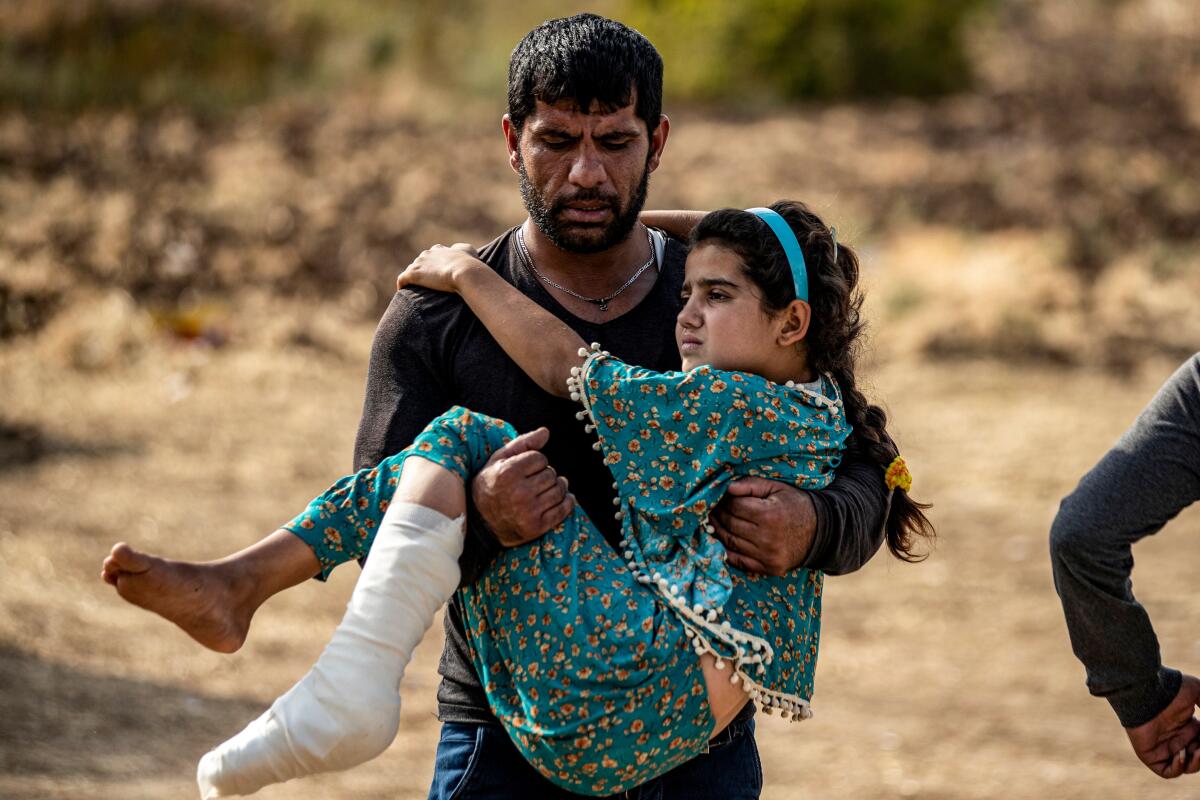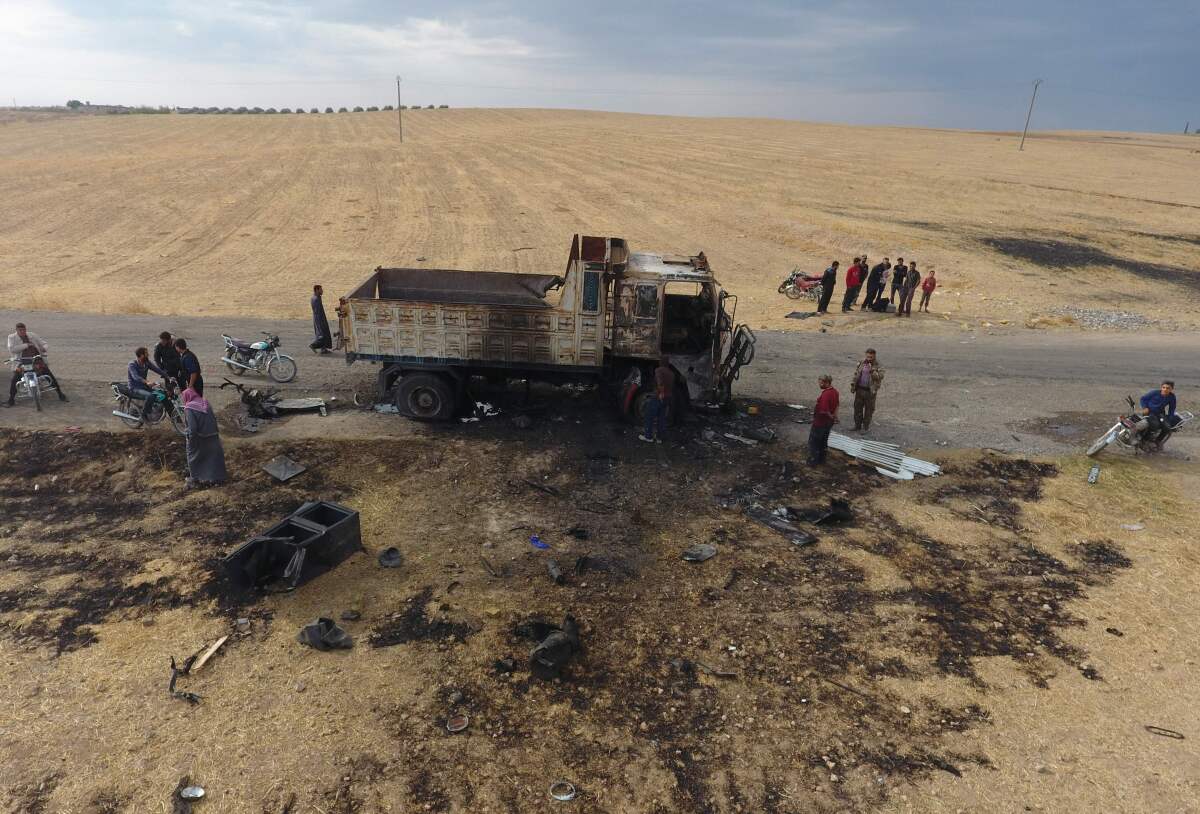Kurdish, Turkish forces jockey for position in Syria ahead of a deadline for Kurds to withdraw from border

- Share via
TAL TAMR, Syria — The roar of warplanes and the thud of distant artillery provided an ominous soundtrack on Monday as various military forces appeared to be jockeying for position in this strategic corner of northeastern Syria.
The now mostly abandoned town of Tal Tamr lies just outside the Turkish-controlled “safe zone” that Russian President Vladimir Putin and his Turkish counterpart, Recep Tayyip Erdogan, agreed last week to create.
Much of Tal Tamr’s population has fled, fearing that clashes occurring closer to the Syrian-Turkish border will spread here. Tens of thousands of displaced people from towns and villages farther north have descended on Tal Tamr or passed through en route to safer areas farther south.
The Kurdish-led Syrian Democratic Forces leadership has said it would respect the Russian-Turkish deal hammered out last week and withdraw its troops to points about 20 miles south of the Syrian-Turkish border by Tuesday. Kurdish forces have been seen pulling back in recent days.
On Monday, skirmishes between Kurdish-led forces and fighters allied with Turkey were reported about six miles north of here. Kurdish forces appeared to be digging in and were setting up observation posts and earthen berms near the line that is to divide Kurdish and Turkish-backed factions.
During the day, pickup trucks brought at least four wounded Kurdish fighters to a small hospital here. Several wounded Syrian government soldiers were also treated here before being transferred to a larger hospital in Hasakah, about 20 miles to the south.
Turkey launched cross-border offensive attacks on Oct. 9 across a broad swath of northern Syria, following President Trump’s announcement of the withdrawal of U.S. forces from the area. The United States had previously been in a military coalition with Syrian Kurdish forces against Islamic State militants.
The protracted military campaign to oust Islamic State from northeastern Syria resulted in the deaths of 11,000 Kurdish Syrian fighters and left 24,000 injured, the Kurds say. Posters with images of Kurdish “martyrs” lost in the campaign adorn roads and buildings throughout the region.
But Turkey, a U.S. NATO ally, views the Syrian Kurdish militias as “terrorists” because of their close ties to Kurdish insurgents in southeastern Turkey. The Syrian Kurds, in turn, accuse Turkey of using Al Qaeda and Islamic State-linked Arab militants as its proxy forces in Syria.
Ankara seeks to create a security cordon along Turkey’s southern border and a Turkish-controlled zone inside Syrian territory for the future relocation of Syrian refugees now residing in Turkey. A U.S.-brokered cease-fire was supposed to end the fighting between Turkish-allied forces and Kurdish-led troops.
However, clashes between Kurdish forces and Ankara’s proxy fighters have been ongoing in the zone designated to be controlled by Ankara.
Meanwhile, some Syrian government forces have been arriving in the border area and appear to be coordinating with the Kurdish fighters. Damascus pulled most of its forces out of northeastern Syria in July 2012, as the government of President Bashar Assad was facing threats from rebel forces on various fronts.
Now, the Russian-Turkish deal envisions a return of Damascus’ troops to northeastern Syria. The agreement calls for Syrian government forces and Russian military police to partner in patrolling certain border zones.
Displaced people — both Kurds and Arabs — continued to stream into this town. Kurdish authorities say the fighting has displaced more than 200,000 people, who have fled to the south or into neighboring Iraq.
Schools here and in nearby towns were packed with people who fled from the Syrian border town of Ras al-Ayn and from nearby villages. Turkish-backed forces now control Ras al-Ayn, which has a majority-Kurdish population.
The Kurds accuse Ankara of carrying out ethnic cleansing in the border zone, forcing out traditional Kurdish populations and replacing them with Syrian Arab militants aligned with Ankara. Turkish officials deny the charge.
“The Turks are bringing in the same Al Qaeda and Islamic State fighters; they are just changing their names,” said Mohammed Bakr, 39, an ethnic Kurd blacksmith who fled with his wife and five children from Ras al-Ayn and was staying in a school here with his family. “They are stealing everything from the Kurds’ homes and burning them to the ground,” Bakr said. “And, if they catch us,” he added, swiping his forefinger across his neck, “we are all dead.”
Meanwhile, Syrian Kurdish forces killed the right-hand man and spokesman for the Islamic State group in a joint operation with U.S. troops in northern Syria, just hours after U.S. special forces killed the extremist group’s leader Abu Bakr Baghdadi, a Kurdish commander said Monday.

The comments came a day after President Trump announced the killing of Baghdadi, a development that left Islamic State without an obvious leader — a major setback for a terrorist organization that in March was forced by American troops and Kurdish forces out of the last portion of its self-declared “caliphate,” which once spanned a swath of Iraq and Syria.
Mazloum Abdi, the commander of the Syrian Democratic Forces, said his group’s intelligence cooperated with the U.S. military Sunday to target Baghdadi’s aide, Abu Hassan Muhajir, in a village near Jarabulus, a town in northwestern Syria. It was part of ongoing operations to hunt down Islamic State leaders, Abdi said.
If confirmed, the death would be another blow to Islamic State. U.S. officials had no immediate comment on the Syrian Kurdish claim or on the fate of Muhajir.
The Associated Press contributed to this report.
More to Read
Sign up for Essential California
The most important California stories and recommendations in your inbox every morning.
You may occasionally receive promotional content from the Los Angeles Times.













